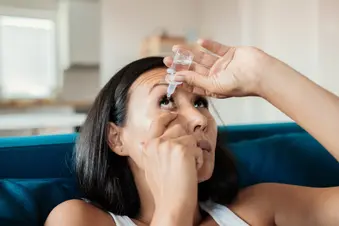
Thyroid eye disease causes problems with your eyes and eyesight, including pain, pressure, dryness, and trouble closing your eyes. Your doctor can prescribe treatments to deal with the underlying cause of the condition. But you can also take steps at home to ease discomfort and improve your vision.
Keep your doctor in the loop about any remedies you decide to use. You might try one or more of the following:
A Cool Compress
A cold, wet cloth or towel on your eye area can ease pain and swelling. The moisture soothes puffy eyes while the cool temperature can numb the area. To make your own cool compress, put ice in a sealable plastic bag and fill it halfway with water. Squeeze out the air and close the bag. Wrap the bag with a wet towel or washcloth, then lay the compress gently across your closed eyes.
Wear Sunglasses
Thyroid eye disease makes your eyes sensitive to sunlight and puts them at risk of UV damage. Dark shades can block bright light and wind, which can cut down on some stinging and irritation. Wraparound sunglasses that extend some of the frame around the sides of your head will offer the most protection.
Lubricate Your Eyes
The dry eye that can come along with thyroid eye disease makes the surface of your eye burn and feel itchy and gritty. Lubricating drops, or “artificial tears,” add moisture to the area and relieve this irritation. You’ll want to use them often, especially when you’re doing activities where you blink less, such as computer work, driving, or reading.
When choosing your drops, avoid ones that remove redness. You can also try a paraffin-based gel on your eyes at night. This is especially helpful if your eyes bulge enough that you have trouble closing your eyelids. The gel can act as a barrier to trap moisture in your eye as you sleep. Ask your doctor for recommendations before you try any drops or gels.
Elevate Your Head in Bed
Swollen eyelids are a common symptom of thyroid eye disease. Instead of lying flat as you sleep, raise the head of your bed. You can either sleep on extra pillows or place rolled up towels under your mattress to create an angle. When your head is higher than the rest of your body, it keeps fluid from building up and relieves pressure on your eyes.
Help Your Lids Close
If your eyes can’t close fully when you sleep, the front of your eye (called the cornea) can dry out. This may lead to ulcers on your eye and vision loss. Talk to your doctor about how to make a plastic wrap dressing you can wear over your eyelids at night to keep them closed and moisturized. Your doctor may also suggest using tape.
Take Care of Your Whole Self
When you make your overall physical and mental health a priority, you give your body the best shot at managing your symptoms. If you smoke, stop. Eat healthy foods, get regular exercise, and work stress-relieving practices such as meditation, mindfulness, or deep breathing exercises into your day to help you feel your best as you treat your condition.